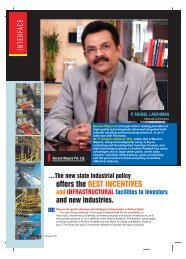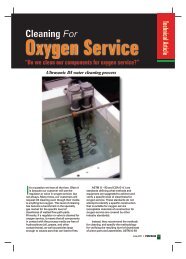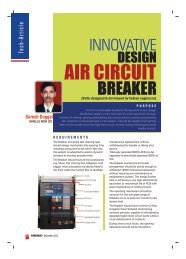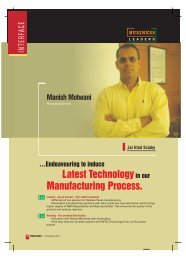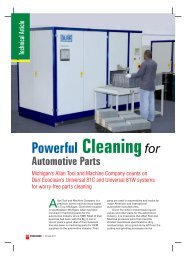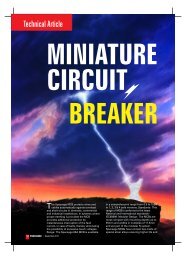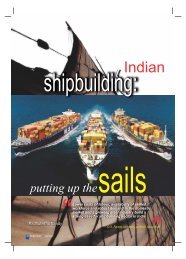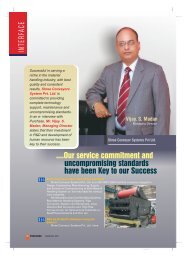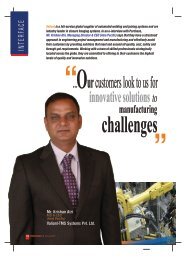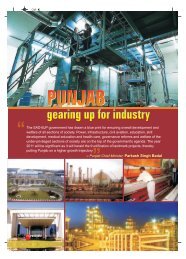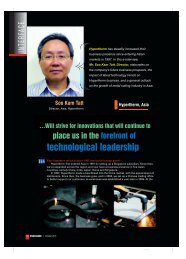Pro-Active Maintenance - Industrial Products
Pro-Active Maintenance - Industrial Products
Pro-Active Maintenance - Industrial Products
Create successful ePaper yourself
Turn your PDF publications into a flip-book with our unique Google optimized e-Paper software.
Technical Article<br />
<strong>Pro</strong>-<strong>Active</strong><br />
<strong>Maintenance</strong><br />
<strong>Pro</strong>-<strong>Active</strong> <strong>Maintenance</strong> is a system or a<br />
life style of keeping the system healthy<br />
and is actually a Life Extension System<br />
which supplants the philosophy of ‘Failure<br />
reactive’ with the ‘Failure <strong>Pro</strong>-<strong>Active</strong>’ by<br />
avoiding the conditions that lead to machine<br />
faults and degradation. The <strong>Pro</strong>-<strong>Active</strong><br />
<strong>Maintenance</strong> technique consists of actions<br />
that abolish the root cause of the failures, not<br />
just symptoms. <strong>Pro</strong>-<strong>Active</strong> maintenance is<br />
now receiving the recognition as the only<br />
means of reducing and saving on the<br />
burgeoning maintenance cost, for extending<br />
the performance life of systems,<br />
conservation of oil and conservation of<br />
energy without much expenditure on the<br />
system or equipments.<br />
It’s a known fact that over 75% of the<br />
breakdowns and the maintenance expenses<br />
in any industry is because of hydraulic and<br />
lubrication oil system failures which is<br />
attributed to excessive contamination level In<br />
the system fluid which has a clear cut<br />
indication towards the necessity of <strong>Pro</strong>-<br />
<strong>Active</strong> <strong>Maintenance</strong>. In fact without properly<br />
understanding and adopting the <strong>Pro</strong>-<strong>Active</strong><br />
<strong>Maintenance</strong> Techniques, we can not be<br />
competitive and grow faster.<br />
In absence of <strong>Pro</strong>-<strong>Active</strong> <strong>Maintenance</strong><br />
Technology the normal approach is Failure<br />
Reactive rather than <strong>Pro</strong>-<strong>Active</strong>, and the<br />
contamination is not controlled and<br />
removed from the system oil, it becomes<br />
contaminated and the looses its properties;<br />
resulting the replacement of oil. The disposal<br />
of discarded oil damages the<br />
environment. Also the contaminations enter<br />
into the gap/clearance between the<br />
moving parts and the parts start scoring,<br />
damaging and restricting the movement,<br />
resulting malfunctioning, Loss of production,<br />
Loss of Energy and frequent<br />
breakdowns.<br />
Many industries carry planned activities<br />
of Preventive <strong>Maintenance</strong> associated with<br />
Predictive maintenance. Under Preventive<br />
<strong>Maintenance</strong> the repair/replacement of<br />
parts and components is done when often<br />
nothing is broken. This is a scheduled<br />
activity, expecting that the life of part,<br />
component or system is over and can give<br />
away any moment. This approach allows the<br />
failure of parts and system as a routine<br />
and normal, permitting the crisis of failure<br />
and maintenance. While under Predictive<br />
<strong>Maintenance</strong> diagnosing, assessment,<br />
investigations and testing are carried out to<br />
find the condition and life span of the parts<br />
and components. Lot of money and time<br />
is spent for prediction of the condition and<br />
life of the components. Alternatively the<br />
<strong>Pro</strong>-<strong>Active</strong> <strong>Maintenance</strong> protects the system<br />
against the Degradation and Failures;<br />
and hence Preventive and Predictive<br />
<strong>Maintenance</strong>s are practically not required.<br />
It is easy to understand the <strong>Pro</strong>-<strong>Active</strong><br />
<strong>Maintenance</strong> by putting parallel with our<br />
body and health, for the reason that human<br />
body is very similar to a<br />
Hydraulic/Lubrication oil system. We all<br />
know that by simply Morning walk and<br />
taking healthy fibrous foods, fruits &<br />
vegetables in place Fried, Junk foods and<br />
Animal Fats which lead to generation of bad<br />
Cholesterol (being Contaminations in the<br />
blood); to keep us healthy, extend our life<br />
and improve our efficiency & performance.<br />
Similarly keeping the system fluid clean and<br />
free from contaminations (Dirt,<br />
Moisture/water and heat etc. being the main<br />
Contaminations in the System Fluid) by<br />
adopting the Systematic<br />
Approach to <strong>Pro</strong>-<strong>Active</strong> <strong>Maintenance</strong>; to<br />
keep our Plant, Machinery and Systems<br />
healthy, extend the life of Hydraulic and<br />
Lubrication Systems & Components<br />
manifold times and improves the efficiency,<br />
performance & <strong>Pro</strong>ductivity of our Plant,<br />
Machinery and Systems and also to<br />
conserve the Energy and costly oils.<br />
In view of the above facts, one must<br />
choose the <strong>Pro</strong>-<strong>Active</strong> approach in place of<br />
the Failure Reactive approach. Er. Ashok<br />
Kumar Gupta the founder and Chairman of<br />
the Crane-Bel Group has taken a challenge of<br />
promoting the <strong>Pro</strong>-<strong>Active</strong> Technology in<br />
Indian Industries through Seminars,<br />
Workshops, Presentations and Practical<br />
Training to achieve the following important<br />
and significant results:<br />
Conservation of Oil: Resulting up to<br />
90% saving on oil <strong>Pro</strong>curement and<br />
122 PURCHASE April 2011
Oil, Lubricants & Gas<br />
Special Industry Review<br />
Environmental <strong>Pro</strong>tection.<br />
Conservation of Energy: Resulting<br />
saving on the Power Bills and also saving the<br />
Environment.<br />
Minimising the Breakdowns: No<br />
Breakdown <strong>Maintenance</strong> and No loss of<br />
production.<br />
Improvement in the Efficiency of<br />
Plant, Machinery and Systems.<br />
<strong>Pro</strong>tection and Retention of Additives<br />
so that no deterioration of hydraulic and<br />
Lubrication oils is there, resulting No<br />
degradation of oil.<br />
Increase in the Operational Life and<br />
Performance of systems and components.<br />
No undue wear and tear of parts and<br />
components and saving on <strong>Maintenance</strong><br />
cost.<br />
Manifold times increase in the life of<br />
systems including hydraulic pumps etc.<br />
Resulting the huge saving in the money<br />
spent for procurement of costly hydraulic<br />
pumps and systems.<br />
Increased efficiency of machinery and<br />
systems result in Higher <strong>Pro</strong>ductivity, Higher<br />
<strong>Pro</strong>fits, Competitiveness and Growth of<br />
business.<br />
Maintaining Clean & Healthy<br />
Environment, Ecological Balance,<br />
<strong>Pro</strong>tection of Lakes, Rivers & Underground<br />
water and subsequently the<br />
Planet Earth.<br />
Implementation of <strong>Pro</strong>-<strong>Active</strong> <strong>Maintenance</strong> System<br />
When it comes to implementation of <strong>Pro</strong>-<br />
<strong>Active</strong> <strong>Maintenance</strong>, the Japanese may be<br />
the global leaders. They have clearly taken a<br />
‘Do-it, Don’t-just-talk-about-it’<br />
approach. Evidence of this comes from<br />
reports by two of the world's largest steel<br />
mills, Nippon Steel and Kawasaki Steel, both<br />
in Japan:<br />
After Nippon Steel implemented the<br />
<strong>Pro</strong>-<strong>Active</strong> <strong>Maintenance</strong> program plantwide,<br />
involving contamination control both<br />
improved filtration and rigorous fluid<br />
cleanliness monitoring, pump replacement<br />
frequencies were reduced to one fifth and<br />
the cumulative frequency of all failures<br />
related to wear and contamination was<br />
reduced to one tenth.<br />
Like wise the implementation of <strong>Pro</strong>-<br />
<strong>Active</strong> <strong>Maintenance</strong> Technology in the<br />
lubricating systems involving both journal<br />
and roller bearings and maintaining the<br />
system fluid clean through proper<br />
contamination control program, Nippon<br />
Steel reported after the three-year period<br />
study, that they have successfully achieved a<br />
50 percent reduction in the bearing purchase<br />
plant-wide.<br />
International Paper Company reported<br />
nearly a 90 percent reduction in bearing<br />
failures in just six months after the<br />
implementation of <strong>Pro</strong>-active <strong>Maintenance</strong><br />
System and improved filtration and<br />
contamination control in their paper mill.<br />
Likewise, Kawasaki Steel, not to be<br />
outdone, implemented a similar <strong>Pro</strong>-active<br />
<strong>Maintenance</strong> program and achieved an<br />
almost unbelievable 97% reduction in<br />
hydraulic component failures.<br />
The British Hydromechanics Research<br />
Association (BHRA) conduct their own<br />
controlled studies for three years and<br />
carefully monitored 117 Hydraulic Machines<br />
including Injection Moulding, Machine Tools,<br />
Material Handling, Mobile, Construction,<br />
Marine, Metal Working and Test Stands, to<br />
establish the benefits of <strong>Pro</strong>-<strong>Active</strong><br />
Contamination Control <strong>Maintenance</strong>. The<br />
results of the study showed a dramatic<br />
relationship between fluid contamination<br />
levels and service life. Improved system<br />
cleanliness achieved extended the time<br />
between failures from 10 to 50 times<br />
depending on cleanliness.<br />
A study by the Naval Air Development<br />
Centre in Warminster. Pennsylvania<br />
performed on aircraft hydraulic pumps<br />
showed nearly a 4-fold wear-life extension<br />
with a 66 percent implementation of <strong>Pro</strong>active<br />
<strong>Maintenance</strong> and improved filtration<br />
and a 13-fold wear-life extension with a 93<br />
percent implementation of <strong>Pro</strong>-active<br />
<strong>Maintenance</strong> and improvement in filtration.<br />
The benefits associated with the <strong>Pro</strong>-<br />
<strong>Active</strong> <strong>Maintenance</strong> Technology in the<br />
Diesel Engine lubrication oils are great.<br />
Historically, there have been many<br />
misconceptions regarding the influence of<br />
contamination of engine service life.<br />
Hence, filters with very poor efficiencies<br />
have been, and are still specified<br />
frequently for engine oils. However, from a<br />
number of important new field and<br />
lab studies, we have concluded that<br />
lubrication oil contamination is the primary<br />
cause of engine wears that begins what is<br />
referred to as the chain-reaction to<br />
failure.<br />
For any further<br />
questions please<br />
contact:<br />
Er. Ashok Kumar Gupta<br />
Chairman<br />
Crane-Bel Group<br />
E-7, Kavi Nagar<br />
<strong>Industrial</strong> Area,<br />
Sector-17, Ghaziabad-<br />
201002, (NCR), INDIA<br />
E-mail: ashok@cranebel.com<br />
, office@crane-bel.com<br />
April 2011<br />
PURCHASE 123



